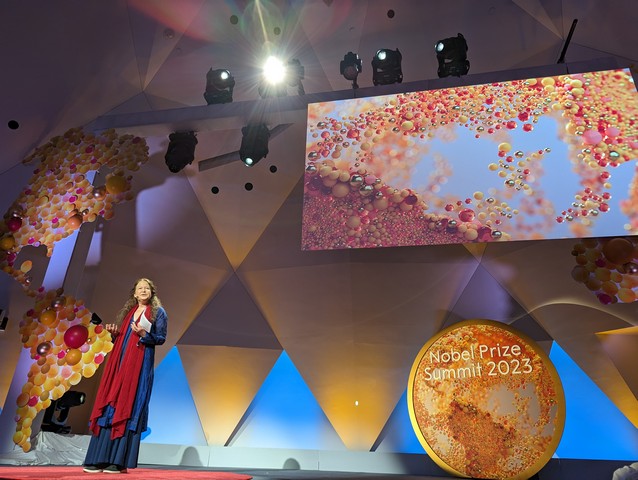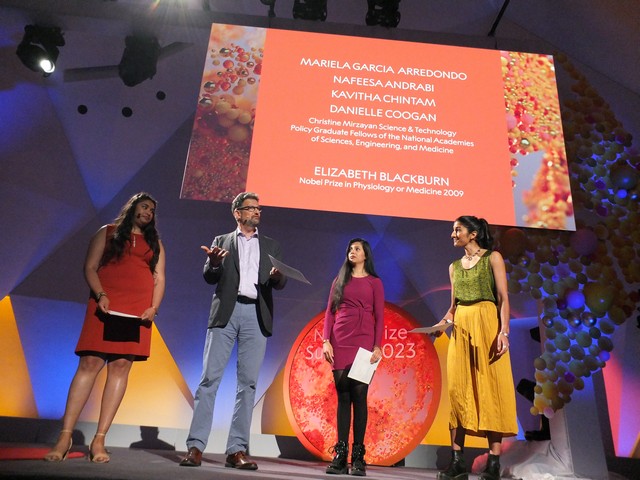"Poetry and science are not opposites, they‚Äôre actually allies," said David Hassler, director of ∫⁄¡œ≥‘πœÕ¯‚Äôs Wick Poetry Center.
Hassler paraphrases American poet Jane Hirshfield, who, in 2017, contacted him to collaborate on a project, which is now an interactive exhibit and writing invitation housed at the Wick Poetry Center on the Kent Campus.

The pair recently performed together at the 2023 Nobel Prize Summit: “Truth, Trust and Hope,” in Washington, D.C.
Poetry and science, Hassler said, come together to create meaningful emotional connections to complex knowledge.
“They’re allies because the microscope and the metaphor are both instruments of discovery that scientists and artists share,” Hassler said. “It’s a similar desire, a passion for asking and pursuing what they don’t know and finding elegant solutions to equations and to problems.”
“The mathematician will talk about the solution to a complex mathematical problem as elegant,” Hassler said, “They will use the aesthetic term to say it’s an ‘elegant solution.’ Well, you could say poetry is an elegant solution in language for what is difficult to say or understand.”
How Hassler and the Wick Poetry Center became part of the Nobel Prize Summit was a journey that connects to both the project and the more recent “ an international interactive poem on the hope brought about by the introduction of COVID-19 vaccines in 2021.
“Dear Vaccine,” created by Wick in conjunction with the University of Arizona’s Poetry Center, became a book and then a stage performance that debuted in October 2022, at the National Academy of Sciences in Washington, D.C.
When Hassler mentioned to academy officials that the Poets for Science exhibit might make a nice addition to one of the academy’s galleries, the academy was quick to welcome the display. The exhibit then caught the eye of members of the Nobel Foundation, who asked if Wick could find a way to connect the exhibit to their summit.

Hassler offered to create a community poem for the summit and taught three online poetry workshops with 2009 Nobel Prize Laureate Elizabeth Blackburn, Ph.D., and four of the National Academy of Sciences’ Christine Mirzayan Science and Technology Policy Graduate Fellows: Mariela Garcia Arredondo, Nafeesa Andrabi, Kavitha Chintam and Danielle Coogan. Drawing from their individual writing, he then scripted a community poem that the group performed on stage at the Nobel Prize Summit. He also tapped Hirshfield to join the creative program.

Since then, the National Academy of Sciences has asked for permission to have the poem designed into a poster to be part of the science poster exhibit at the Academy.
Hassler and Hirshfield also will be joining forces to make Poets for Science a large global call for science poems, like "Dear Vaccine," which Hassler hopes also will become a printed anthology.
With science – particularly topics like global warming – under fire politically, Hassler said it is a critical time when poetry can help bring science to the masses in meaningful ways.
“Poetry can be a way of communicating science in a way that makes it very accessible and relevant to our lives and I think that’s part of the struggle that science is having now,” Hassler said.
The Poets for Science Exhibit will remain on display at the National Academy of Sciences through September, when it will move to the academy’s Keck Center, also in Washington, D.C., where it will remain through the end of the year.
Video file
Here is the text of the community poem scripted by Hassler for the Nobel summit, comprised of writing by participants in his poetry workshop: Arredondo, Andrabi, Chintam, Coogan and Blackburn:
“Origin Story: A Nobel Prize Summit Community Poem” – After Camille Dungy’s “Characteristics of Life”
Ask me if I speak for myself
and I will say, what is a self but a tangle,
a cobweb of stories, generations deep,
stitched together by Earth’s fibers.
Udi lethu, Ithi kadu.
Nothing I speak is without the trace –
channeled scablands –
of every path carved before me,
a single molecular origin story.
The tiniest wriggling organism,
invisible in its still, dark pond water
can tell us truths that inspire. Yet how can I speak
for the molecules dancing in each living
creature, calling back- and-forth?
I eavesdrop on their gossipy chatter,
ask them to explain, but mostly
they take the fifth.
Ask me what I know of the morning banter
of the blue jay, the scrub jay, the cooing of doves,
and I will tell you, I know only
the meaning I make of their song.
How can I speak for the soil,
welcoming all, hugging seeds
that spring forward in shoots?
Nuestro suelo, terreno, y tierra
bursting with black and ruddy colors
that envelop our skin and keep our bellies fed.
More and more I have come to trust
in the circularity of a tree,
how it yearns itself out of the soil,
from sprout, to seedling, to sapling,
then rots and returns to the Earth.
When I trust the coffee shop stranger
to watch my backpack, I leap
into the woven net of ties between us.
We catch each other holding doors open,
offer our hands in greeting,
each of us the same stardust rearranged.
I speak to unself myself,
to tell the truth of the origin story
we share with our planet.
A truth lost too often in rushing days
and racing thoughts. A truth coursing
through the ventricles in my heart,
whispers of ancestors, trees, and oceans.
Bol ke sach zinda hai ab tak.
I speak for the Earth,
and the Earth speaks through me.
Our narratives cannot be untangled.
Photo credits: Bruce Guthrie for the National Academy of Sciences, David Hassler and Don Hassler.
WRITTEN BY: LISA ABRAHAM

